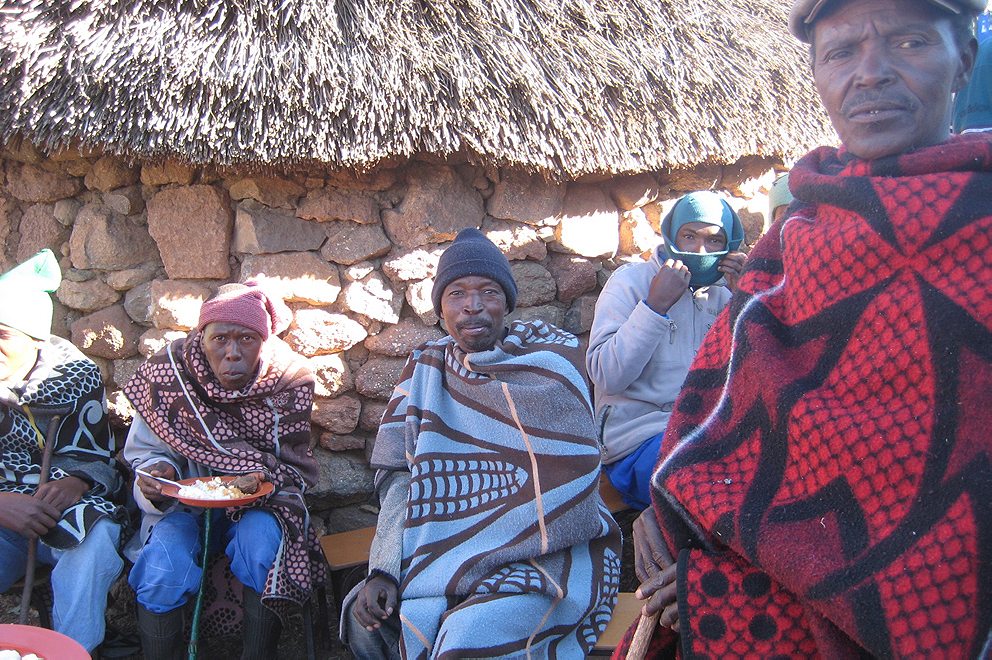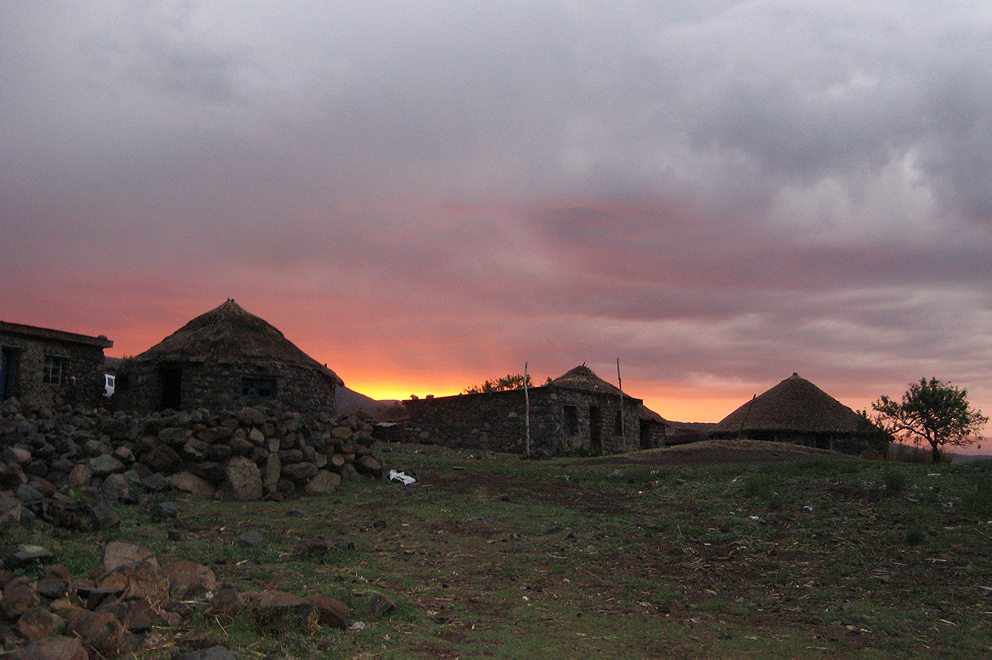Armed with a traditional walking stick and some killer dance moves, a Westerner enters the fray in Lesotho.
We are drawn by the pulsing famo beat, drawn from our rondavel in dark of night, down past the turn in the river and the semi-deserted hospital, down toward the grounds of the vacant hotel and into the gutted adjacent building—some defunct abattoir—where all hog-butchering has been laid aside to give the band some space to play. The building is a dusty cinderblock warehouse, windows painted over, walls shedding plaster, the whole place haunted and forbidding.
And there is an honest-to-God famo band napalming the stage—actually, there’s no stage, defunct abattoirs don’t have stages—but the singer is raging and the drummer is raging and the dancers are raging, though not the accordionist or the bassist, because those two stonefaced motherfuckers are motionless, wearing sunglasses, chain-smoking, sitting with their backs to the crowd, and laying down an absolutely dirty line of accordion-bass polyphony.
But perhaps I am getting ahead of myself, because I don’t want to skip over the man with the machine gun, and because I want to make sure, first of all, that we know what famo is.
(For the curious: it’s FAH-MOO.)
Famo is the reigning musical genre in the southern African nation of Lesotho—that glorious mountain kingdom, all boulder and canyon, where the scorched-red earth of the foothills soon gives way to wind-blasted basalt and dizzying donkey trails along gorge edge—that tiny peaceful nation tucked unobtrusively within the poison bosom of South Africa.
(For the curious: it’s LEH-SOO-TOO.)

Famo sounds like some African step-cousin of zydeco. The music is filled with plaintive, reedy accordion runs built over a foundation of stuttering bassline (guh-duggah-duhduh-guhduh) and thumping basso kickdrum, then filigreed with bright guitar flourishes and fluttering synthesizer trills. These last two instruments—the guitar and synthesizer—are unnecessarily rococo additions, however. Accordion, bass, and drums are all you need. Layered over this three-piece shuffle-stomp, the vocals take the form of: A) breathless Sesotho raps, the words all fused into one Germanically-constructed superstring, or B) melodic moans that follow along with the accordion line.
It is, perhaps, an acquired taste.
It is always important to be on the same page as the man with the machine gun
But when there is a live famo band playing in a warehouse that doubles as a slasher film backdrop, then one must go, even when it is late and one is in one’s pajamas and the man at the door is casually shoulder-slung with heavy firepower. Live music is incredibly rare up here in the eastern mountains of Mokhotlong district, where the passes snow over for days and the only way into and out of town is via missionary-flown Piper Cub.
To be precise: the man with the machine gun is not the first person to meet us at the door. The first people we meet at the door are collecting cover for the band and they try to jack up the price. But then, as we haggle, the man with the machine gun comes over and ends the discussion.
We will pay the same price that everyone else did, he says, and not the quoted price, which was double.
“Kea leboha, ntate,” I say, giving him the tripartite Sesotho handshake, because it is always important to be on the same page as the man with the machine gun.
Despite the fact that the warehouse-barn-abattoir is mostly empty—the small numbers in our party have almost doubled the crowd—the band is burning through their set. The singer wails into the mic and flops onto the ground, his lyrics beyond distorted through the blown-out P.A. The drummer bludgeons his kit until a cymbal stand topples over. His bass drum keeps sliding out from under his right foot, metal supports slipping over smooth concrete, even though the drum is held in place with several small boulders. An unsecured cymbal flips off and rolls away after a particularly vicious crash hit and an audience member returns it to him. The accordionist is busy not caring and the bass player is busy not caring, while at the same time slathering his dirty-dirty bassline all over the floor. The dancers—because the presence of a dance team is another famo fundamental—are three men in matching t-shirts, wrapped in traditional woolen Basotho blankets, doing coordinated hop-skips, shoulder-dips, and one-footers, all the while swinging their wooden molamo in beer-dazed ecstasy. These are people deep in their métier.
Here in the warehouse-barn-abattoir, the crowd is deep Basotho. Everyone is in blankets and gumboots, all the dudes are molamo-wielding shepherds, everybody is straight-up country. While the camptown here in Mokhotlong district is quite remote, it is the regional hub and thus modernized to an extent. (Point: there is an ATM in the camptown. Counterpoint: people withdrawing money often arrive on horseback.) The people in the crowd tonight are distinctly non-modernized, though. They are grizzled and backwoods, in from the outer villages where they don’t run power lines. Everybody is staring hard at us, unflinching, just staring.
That is, until my friend Reid gets up to dance.
Any remaining semblances of propriety are hauled into the street and shot at dawn
When Reid gets up to dance, borrowing my wooden molamo—the intricately decorated shepherd’s cane that was made for me by a Mosotho friend, which I brought along tonight because it is de rigueur to bring one’s molamo to a shindig like this—well, when Reid gets up to dance the people in the crowd are no longer just staring, they are bug-eyed and leg-slapping, hooting and ululating. The crowd is genuinely jaw-dropped that lekhooa is not only dancing, and with a legit molamo no less, but lekhooa actually seems to know the steps.
This is because we practice.
Reid’s dancing cracks open the floor. Any remaining semblances of propriety are hauled into the street and shot at dawn. We are all up here now, these deep Basotho up and around us, doing the hop-skip and the shoulder-dip and the one-footer, doing the scoot-scoot and the double stomp and the clackety-hop. The locals are doing the tooth-whistle and the bird chirp too, since Basotho are—by birthright—the most creative and dexterous of whistlers. This acrobatic whistling is another famo essential, and is beyond the capabilities of any makhooa.
The dancing goes on for some time. At one point I split off from a wild pseudo-conga line and head to the adjoining public bar to grab two quarts of beer to share with our party. While I am waiting to pay, a man sitting at the bar asks me: “Are you a promoter?”
I glance toward the warehouse-barn-abattoir, then back at the man on the stool. I tell him that I am not a promoter, although I am enjoying the band.
He arches an eyebrow. “I think you are a promoter.”
I raise my beers toward him and head back to the music, nodding at the man with the machine gun as I enter. The bottles are passed around, down our row of folding chairs, throughout our group, and then into other rows and off into the night.

A short while later I am talking to the man with the machine gun.
“My name is Adam,” he tells me, using an English name he would have received in primary school. “I am the first man.” He grins broadly at his joke.
I tell him I am very pleased that he is here with his machine gun to make sure no trouble happens at the concert. I tell him that the makhooa all feel very safe because he is here. Adam the First Man becomes bashful, eyes down, and seems deeply honored by this remark.
The famo band continues to rattle the painted-over windows. The dancers continue to whirligig across the cement floor. One little herd boy is out here, maybe eight years old and well past his bedtime. He is in full pastoral regalia—blanket worn cape-like over the shoulders, gumboots, wool balaclava pulled up over his face—and he is hop-scotching through the crowd as he drinks from a giant glass Coke bottle, while everyone else is drinking Maluti and Marzen Gold.
Two youngish bo-’m’e are sitting in the chairs in front of us. These women are laughing with us, or at us, or both, thinking it’s fantastic that we know the dance steps and how to hold the molamo properly. Occasionally they grab the molamo and run off to dance with it—a move which is slightly transgressive since only bo-ntate are supposed to dance with the molamo.
After a while, Adam the First Man comes up to me and whispers in my ear.
“Those bo-’m’e, you must limit your interactions with them.”
I look up at him, then over at the women dancing with the molamo.
He nods. I nod back.
A few minutes later, Adam the First Man comes back and whispers in my ear again.
“It is okay to talk with them, but you must limit your interactions with them.”
I nod again. I tell him that perhaps we will talk with these bo-’m’e, but we will limit our interactions with them. I have no idea what this means.
Adam the First Man is satisfied and returns to guard the door.
Eventually—after we have danced a bit more, shown off our shoulder-shaking, our ululating, our molamo-swinging—we decide that it is time to head back home. We have been doing our best to talk with the bo-’m’e, who seem perfectly nice, while continuing to limit our interactions with them. As we head toward the door, the lead singer comes over to shake our hands and escort us out, while the band continues to play without him. I look for Adam the First Man, but he is nowhere in sight, off somewhere keeping the peace. We are sweaty and smoky and bell-rung in the head.

Back out in the icy Mokhotlong air:
The devil dogs are scavenging. We can see their glinting eyes, their shadowy serpentine profiles slipping between houses and rondavels.
Suddenly Adam the First Man comes chasing up the hill after us.
“Stop!” he calls out, so we all stop, since that is the sensible thing to do when a man with a machine gun comes chasing after you in the abyssal dark of a mountain night.
“I am sorry,” he says, straining and huffing, “I am sorry.”
We shift our weight as he catches his breath.
“But I was hoping to acquire your email addresses.”